Human Resource Management in AirAsia Airlines
VerifiedAdded on 2023/06/12
|10
|2648
|160
AI Summary
This essay analyzes the importance of human resource planning in AirAsia Airlines, challenges in labor demand and supply, and the impact of internal and external factors on strategic human resource planning. It also discusses the major external and internal changes faced by AirAsia Airlines, issues related to employee turnover, and the importance of succession planning in the organization.
Contribute Materials
Your contribution can guide someone’s learning journey. Share your
documents today.
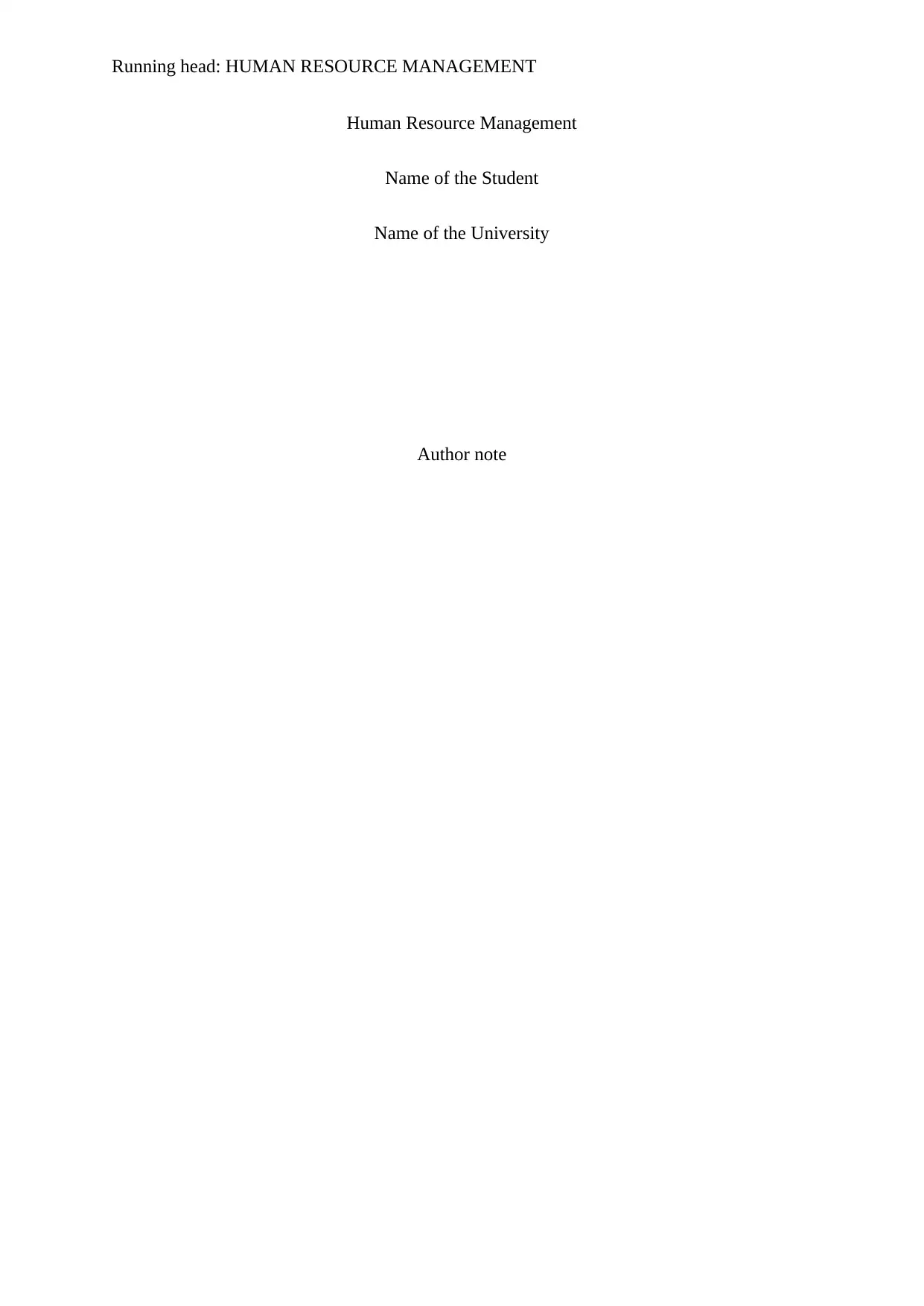
Running head: HUMAN RESOURCE MANAGEMENT
Human Resource Management
Name of the Student
Name of the University
Author note
Human Resource Management
Name of the Student
Name of the University
Author note
Secure Best Marks with AI Grader
Need help grading? Try our AI Grader for instant feedback on your assignments.
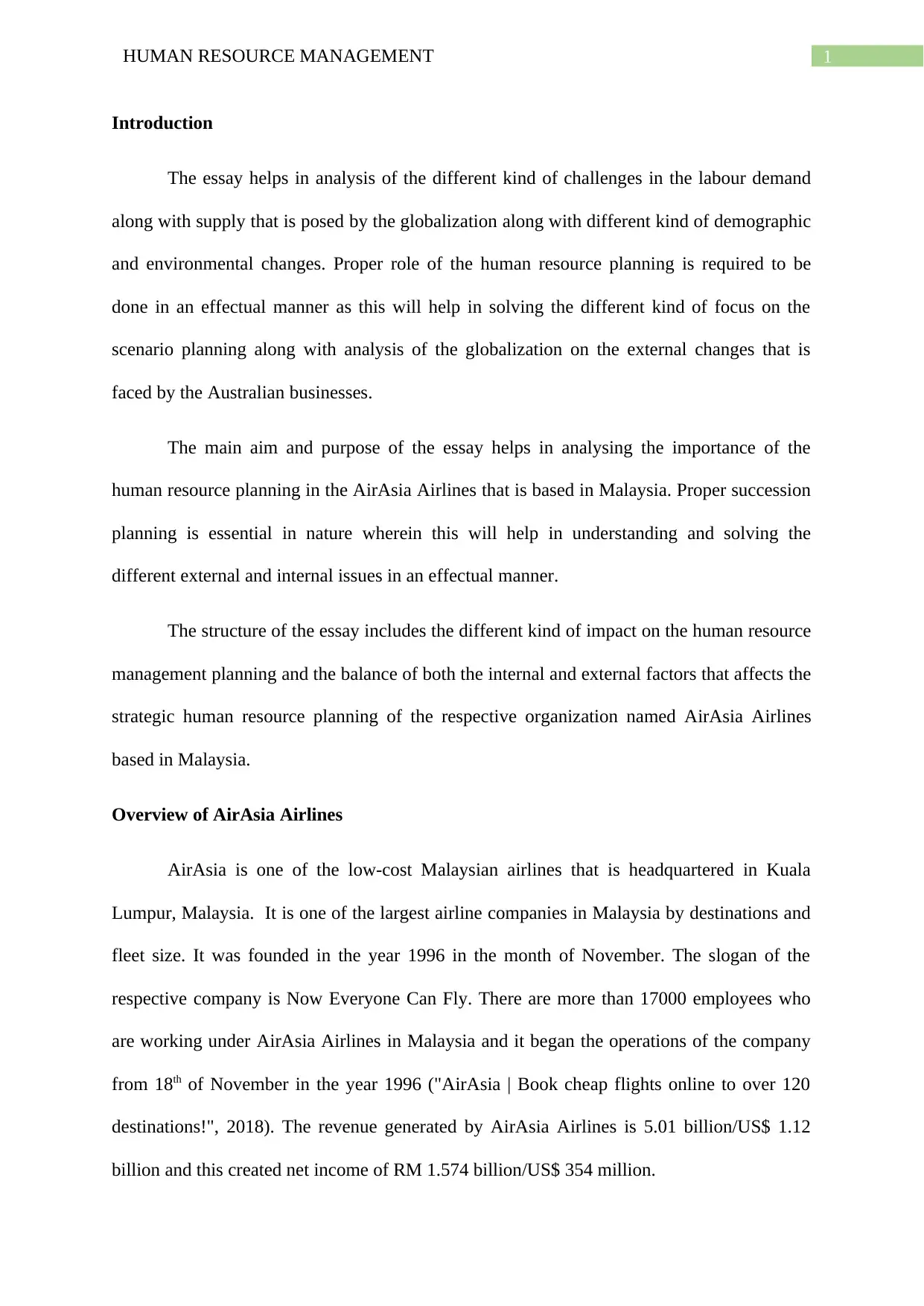
1HUMAN RESOURCE MANAGEMENT
Introduction
The essay helps in analysis of the different kind of challenges in the labour demand
along with supply that is posed by the globalization along with different kind of demographic
and environmental changes. Proper role of the human resource planning is required to be
done in an effectual manner as this will help in solving the different kind of focus on the
scenario planning along with analysis of the globalization on the external changes that is
faced by the Australian businesses.
The main aim and purpose of the essay helps in analysing the importance of the
human resource planning in the AirAsia Airlines that is based in Malaysia. Proper succession
planning is essential in nature wherein this will help in understanding and solving the
different external and internal issues in an effectual manner.
The structure of the essay includes the different kind of impact on the human resource
management planning and the balance of both the internal and external factors that affects the
strategic human resource planning of the respective organization named AirAsia Airlines
based in Malaysia.
Overview of AirAsia Airlines
AirAsia is one of the low-cost Malaysian airlines that is headquartered in Kuala
Lumpur, Malaysia. It is one of the largest airline companies in Malaysia by destinations and
fleet size. It was founded in the year 1996 in the month of November. The slogan of the
respective company is Now Everyone Can Fly. There are more than 17000 employees who
are working under AirAsia Airlines in Malaysia and it began the operations of the company
from 18th of November in the year 1996 ("AirAsia | Book cheap flights online to over 120
destinations!", 2018). The revenue generated by AirAsia Airlines is 5.01 billion/US$ 1.12
billion and this created net income of RM 1.574 billion/US$ 354 million.
Introduction
The essay helps in analysis of the different kind of challenges in the labour demand
along with supply that is posed by the globalization along with different kind of demographic
and environmental changes. Proper role of the human resource planning is required to be
done in an effectual manner as this will help in solving the different kind of focus on the
scenario planning along with analysis of the globalization on the external changes that is
faced by the Australian businesses.
The main aim and purpose of the essay helps in analysing the importance of the
human resource planning in the AirAsia Airlines that is based in Malaysia. Proper succession
planning is essential in nature wherein this will help in understanding and solving the
different external and internal issues in an effectual manner.
The structure of the essay includes the different kind of impact on the human resource
management planning and the balance of both the internal and external factors that affects the
strategic human resource planning of the respective organization named AirAsia Airlines
based in Malaysia.
Overview of AirAsia Airlines
AirAsia is one of the low-cost Malaysian airlines that is headquartered in Kuala
Lumpur, Malaysia. It is one of the largest airline companies in Malaysia by destinations and
fleet size. It was founded in the year 1996 in the month of November. The slogan of the
respective company is Now Everyone Can Fly. There are more than 17000 employees who
are working under AirAsia Airlines in Malaysia and it began the operations of the company
from 18th of November in the year 1996 ("AirAsia | Book cheap flights online to over 120
destinations!", 2018). The revenue generated by AirAsia Airlines is 5.01 billion/US$ 1.12
billion and this created net income of RM 1.574 billion/US$ 354 million.
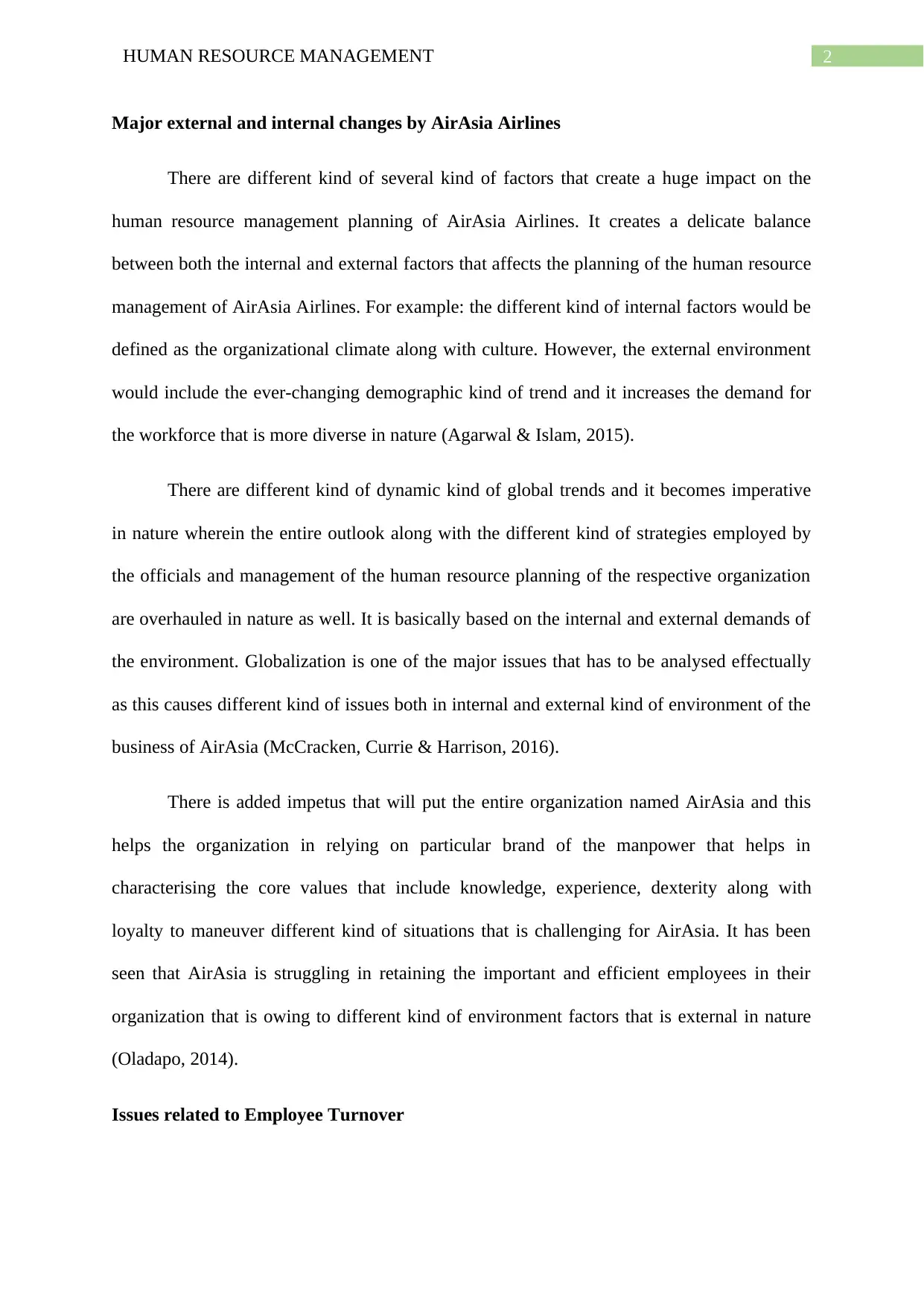
2HUMAN RESOURCE MANAGEMENT
Major external and internal changes by AirAsia Airlines
There are different kind of several kind of factors that create a huge impact on the
human resource management planning of AirAsia Airlines. It creates a delicate balance
between both the internal and external factors that affects the planning of the human resource
management of AirAsia Airlines. For example: the different kind of internal factors would be
defined as the organizational climate along with culture. However, the external environment
would include the ever-changing demographic kind of trend and it increases the demand for
the workforce that is more diverse in nature (Agarwal & Islam, 2015).
There are different kind of dynamic kind of global trends and it becomes imperative
in nature wherein the entire outlook along with the different kind of strategies employed by
the officials and management of the human resource planning of the respective organization
are overhauled in nature as well. It is basically based on the internal and external demands of
the environment. Globalization is one of the major issues that has to be analysed effectually
as this causes different kind of issues both in internal and external kind of environment of the
business of AirAsia (McCracken, Currie & Harrison, 2016).
There is added impetus that will put the entire organization named AirAsia and this
helps the organization in relying on particular brand of the manpower that helps in
characterising the core values that include knowledge, experience, dexterity along with
loyalty to maneuver different kind of situations that is challenging for AirAsia. It has been
seen that AirAsia is struggling in retaining the important and efficient employees in their
organization that is owing to different kind of environment factors that is external in nature
(Oladapo, 2014).
Issues related to Employee Turnover
Major external and internal changes by AirAsia Airlines
There are different kind of several kind of factors that create a huge impact on the
human resource management planning of AirAsia Airlines. It creates a delicate balance
between both the internal and external factors that affects the planning of the human resource
management of AirAsia Airlines. For example: the different kind of internal factors would be
defined as the organizational climate along with culture. However, the external environment
would include the ever-changing demographic kind of trend and it increases the demand for
the workforce that is more diverse in nature (Agarwal & Islam, 2015).
There are different kind of dynamic kind of global trends and it becomes imperative
in nature wherein the entire outlook along with the different kind of strategies employed by
the officials and management of the human resource planning of the respective organization
are overhauled in nature as well. It is basically based on the internal and external demands of
the environment. Globalization is one of the major issues that has to be analysed effectually
as this causes different kind of issues both in internal and external kind of environment of the
business of AirAsia (McCracken, Currie & Harrison, 2016).
There is added impetus that will put the entire organization named AirAsia and this
helps the organization in relying on particular brand of the manpower that helps in
characterising the core values that include knowledge, experience, dexterity along with
loyalty to maneuver different kind of situations that is challenging for AirAsia. It has been
seen that AirAsia is struggling in retaining the important and efficient employees in their
organization that is owing to different kind of environment factors that is external in nature
(Oladapo, 2014).
Issues related to Employee Turnover
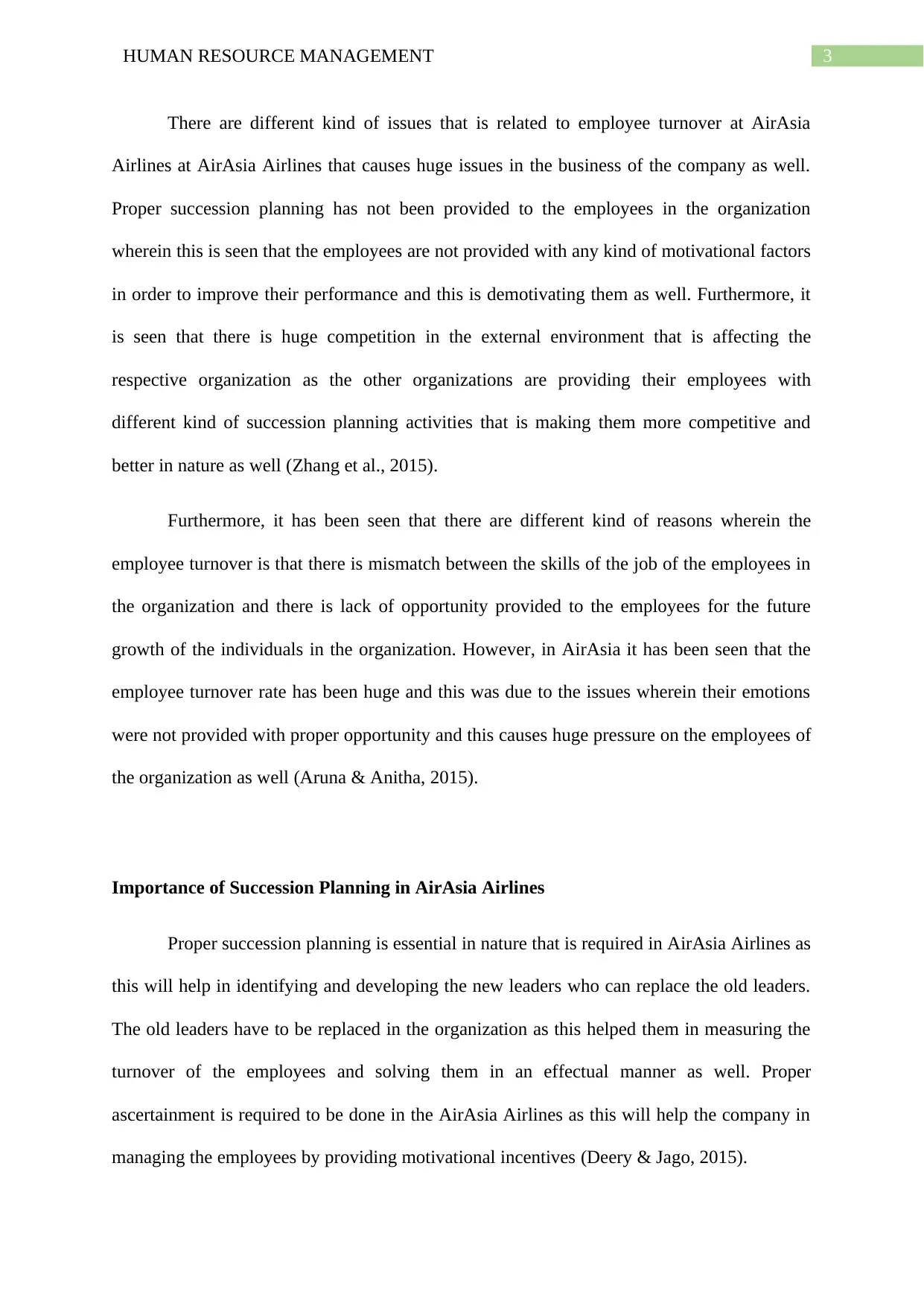
3HUMAN RESOURCE MANAGEMENT
There are different kind of issues that is related to employee turnover at AirAsia
Airlines at AirAsia Airlines that causes huge issues in the business of the company as well.
Proper succession planning has not been provided to the employees in the organization
wherein this is seen that the employees are not provided with any kind of motivational factors
in order to improve their performance and this is demotivating them as well. Furthermore, it
is seen that there is huge competition in the external environment that is affecting the
respective organization as the other organizations are providing their employees with
different kind of succession planning activities that is making them more competitive and
better in nature as well (Zhang et al., 2015).
Furthermore, it has been seen that there are different kind of reasons wherein the
employee turnover is that there is mismatch between the skills of the job of the employees in
the organization and there is lack of opportunity provided to the employees for the future
growth of the individuals in the organization. However, in AirAsia it has been seen that the
employee turnover rate has been huge and this was due to the issues wherein their emotions
were not provided with proper opportunity and this causes huge pressure on the employees of
the organization as well (Aruna & Anitha, 2015).
Importance of Succession Planning in AirAsia Airlines
Proper succession planning is essential in nature that is required in AirAsia Airlines as
this will help in identifying and developing the new leaders who can replace the old leaders.
The old leaders have to be replaced in the organization as this helped them in measuring the
turnover of the employees and solving them in an effectual manner as well. Proper
ascertainment is required to be done in the AirAsia Airlines as this will help the company in
managing the employees by providing motivational incentives (Deery & Jago, 2015).
There are different kind of issues that is related to employee turnover at AirAsia
Airlines at AirAsia Airlines that causes huge issues in the business of the company as well.
Proper succession planning has not been provided to the employees in the organization
wherein this is seen that the employees are not provided with any kind of motivational factors
in order to improve their performance and this is demotivating them as well. Furthermore, it
is seen that there is huge competition in the external environment that is affecting the
respective organization as the other organizations are providing their employees with
different kind of succession planning activities that is making them more competitive and
better in nature as well (Zhang et al., 2015).
Furthermore, it has been seen that there are different kind of reasons wherein the
employee turnover is that there is mismatch between the skills of the job of the employees in
the organization and there is lack of opportunity provided to the employees for the future
growth of the individuals in the organization. However, in AirAsia it has been seen that the
employee turnover rate has been huge and this was due to the issues wherein their emotions
were not provided with proper opportunity and this causes huge pressure on the employees of
the organization as well (Aruna & Anitha, 2015).
Importance of Succession Planning in AirAsia Airlines
Proper succession planning is essential in nature that is required in AirAsia Airlines as
this will help in identifying and developing the new leaders who can replace the old leaders.
The old leaders have to be replaced in the organization as this helped them in measuring the
turnover of the employees and solving them in an effectual manner as well. Proper
ascertainment is required to be done in the AirAsia Airlines as this will help the company in
managing the employees by providing motivational incentives (Deery & Jago, 2015).
Secure Best Marks with AI Grader
Need help grading? Try our AI Grader for instant feedback on your assignments.
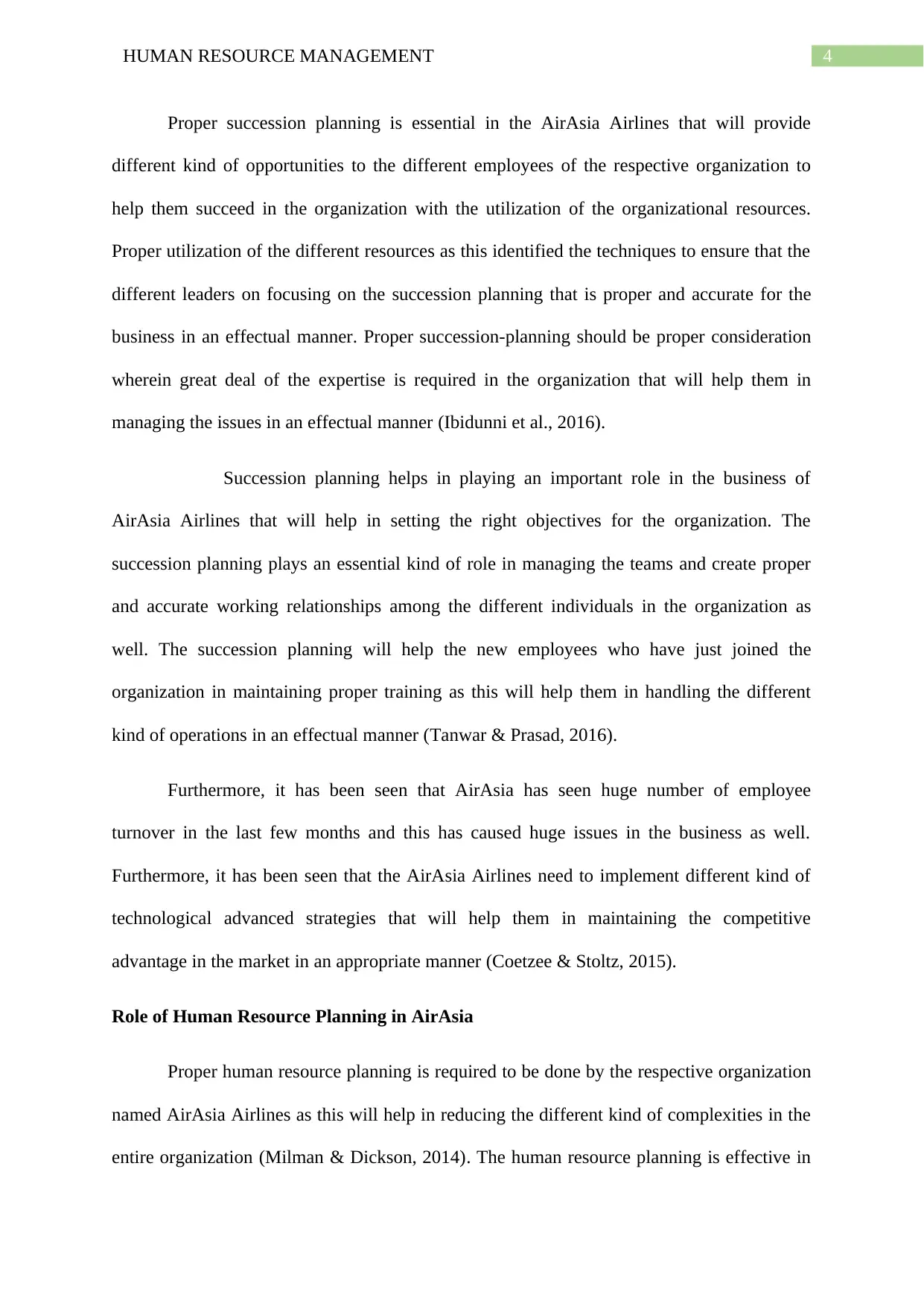
4HUMAN RESOURCE MANAGEMENT
Proper succession planning is essential in the AirAsia Airlines that will provide
different kind of opportunities to the different employees of the respective organization to
help them succeed in the organization with the utilization of the organizational resources.
Proper utilization of the different resources as this identified the techniques to ensure that the
different leaders on focusing on the succession planning that is proper and accurate for the
business in an effectual manner. Proper succession-planning should be proper consideration
wherein great deal of the expertise is required in the organization that will help them in
managing the issues in an effectual manner (Ibidunni et al., 2016).
Succession planning helps in playing an important role in the business of
AirAsia Airlines that will help in setting the right objectives for the organization. The
succession planning plays an essential kind of role in managing the teams and create proper
and accurate working relationships among the different individuals in the organization as
well. The succession planning will help the new employees who have just joined the
organization in maintaining proper training as this will help them in handling the different
kind of operations in an effectual manner (Tanwar & Prasad, 2016).
Furthermore, it has been seen that AirAsia has seen huge number of employee
turnover in the last few months and this has caused huge issues in the business as well.
Furthermore, it has been seen that the AirAsia Airlines need to implement different kind of
technological advanced strategies that will help them in maintaining the competitive
advantage in the market in an appropriate manner (Coetzee & Stoltz, 2015).
Role of Human Resource Planning in AirAsia
Proper human resource planning is required to be done by the respective organization
named AirAsia Airlines as this will help in reducing the different kind of complexities in the
entire organization (Milman & Dickson, 2014). The human resource planning is effective in
Proper succession planning is essential in the AirAsia Airlines that will provide
different kind of opportunities to the different employees of the respective organization to
help them succeed in the organization with the utilization of the organizational resources.
Proper utilization of the different resources as this identified the techniques to ensure that the
different leaders on focusing on the succession planning that is proper and accurate for the
business in an effectual manner. Proper succession-planning should be proper consideration
wherein great deal of the expertise is required in the organization that will help them in
managing the issues in an effectual manner (Ibidunni et al., 2016).
Succession planning helps in playing an important role in the business of
AirAsia Airlines that will help in setting the right objectives for the organization. The
succession planning plays an essential kind of role in managing the teams and create proper
and accurate working relationships among the different individuals in the organization as
well. The succession planning will help the new employees who have just joined the
organization in maintaining proper training as this will help them in handling the different
kind of operations in an effectual manner (Tanwar & Prasad, 2016).
Furthermore, it has been seen that AirAsia has seen huge number of employee
turnover in the last few months and this has caused huge issues in the business as well.
Furthermore, it has been seen that the AirAsia Airlines need to implement different kind of
technological advanced strategies that will help them in maintaining the competitive
advantage in the market in an appropriate manner (Coetzee & Stoltz, 2015).
Role of Human Resource Planning in AirAsia
Proper human resource planning is required to be done by the respective organization
named AirAsia Airlines as this will help in reducing the different kind of complexities in the
entire organization (Milman & Dickson, 2014). The human resource planning is effective in
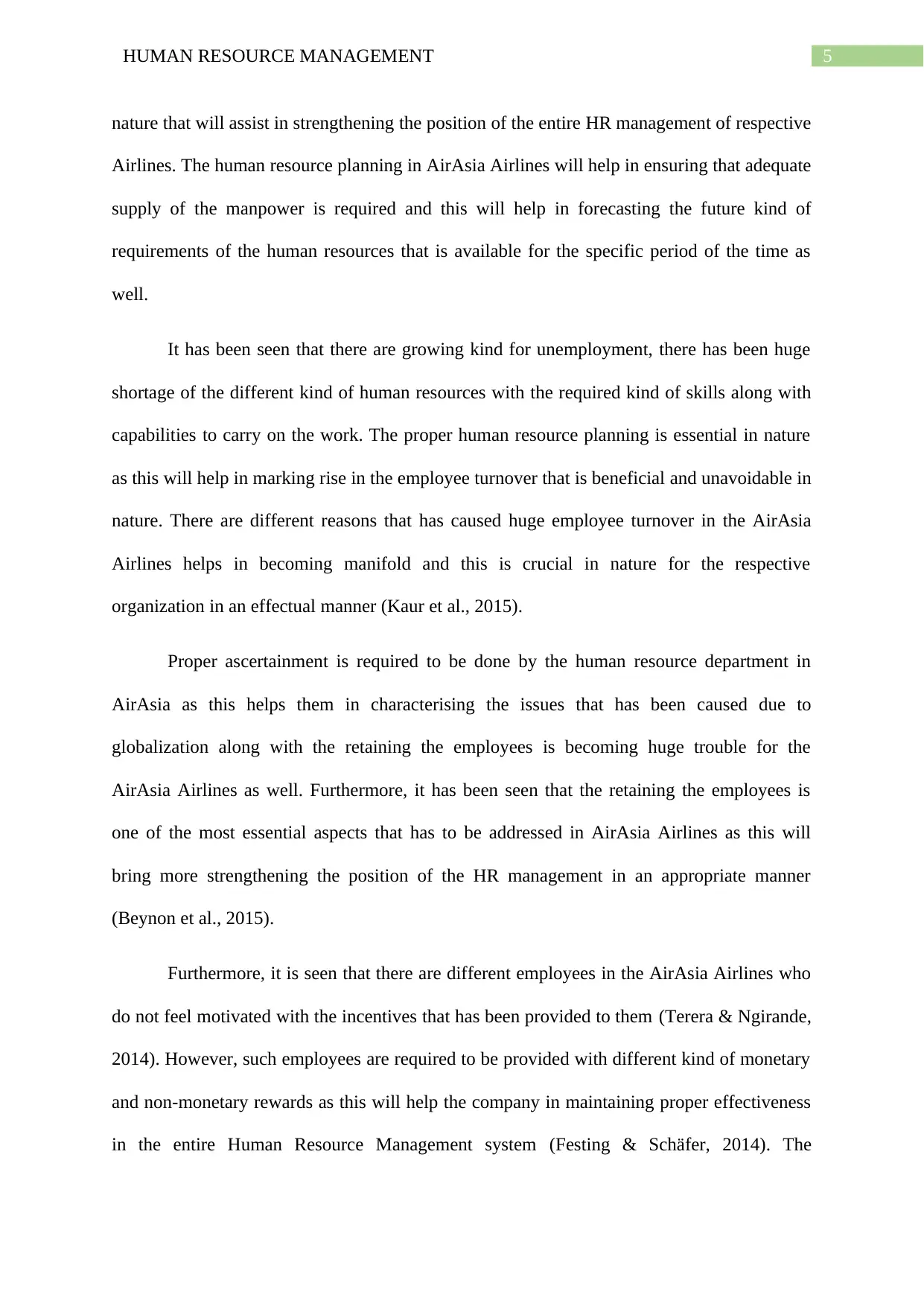
5HUMAN RESOURCE MANAGEMENT
nature that will assist in strengthening the position of the entire HR management of respective
Airlines. The human resource planning in AirAsia Airlines will help in ensuring that adequate
supply of the manpower is required and this will help in forecasting the future kind of
requirements of the human resources that is available for the specific period of the time as
well.
It has been seen that there are growing kind for unemployment, there has been huge
shortage of the different kind of human resources with the required kind of skills along with
capabilities to carry on the work. The proper human resource planning is essential in nature
as this will help in marking rise in the employee turnover that is beneficial and unavoidable in
nature. There are different reasons that has caused huge employee turnover in the AirAsia
Airlines helps in becoming manifold and this is crucial in nature for the respective
organization in an effectual manner (Kaur et al., 2015).
Proper ascertainment is required to be done by the human resource department in
AirAsia as this helps them in characterising the issues that has been caused due to
globalization along with the retaining the employees is becoming huge trouble for the
AirAsia Airlines as well. Furthermore, it has been seen that the retaining the employees is
one of the most essential aspects that has to be addressed in AirAsia Airlines as this will
bring more strengthening the position of the HR management in an appropriate manner
(Beynon et al., 2015).
Furthermore, it is seen that there are different employees in the AirAsia Airlines who
do not feel motivated with the incentives that has been provided to them (Terera & Ngirande,
2014). However, such employees are required to be provided with different kind of monetary
and non-monetary rewards as this will help the company in maintaining proper effectiveness
in the entire Human Resource Management system (Festing & Schäfer, 2014). The
nature that will assist in strengthening the position of the entire HR management of respective
Airlines. The human resource planning in AirAsia Airlines will help in ensuring that adequate
supply of the manpower is required and this will help in forecasting the future kind of
requirements of the human resources that is available for the specific period of the time as
well.
It has been seen that there are growing kind for unemployment, there has been huge
shortage of the different kind of human resources with the required kind of skills along with
capabilities to carry on the work. The proper human resource planning is essential in nature
as this will help in marking rise in the employee turnover that is beneficial and unavoidable in
nature. There are different reasons that has caused huge employee turnover in the AirAsia
Airlines helps in becoming manifold and this is crucial in nature for the respective
organization in an effectual manner (Kaur et al., 2015).
Proper ascertainment is required to be done by the human resource department in
AirAsia as this helps them in characterising the issues that has been caused due to
globalization along with the retaining the employees is becoming huge trouble for the
AirAsia Airlines as well. Furthermore, it has been seen that the retaining the employees is
one of the most essential aspects that has to be addressed in AirAsia Airlines as this will
bring more strengthening the position of the HR management in an appropriate manner
(Beynon et al., 2015).
Furthermore, it is seen that there are different employees in the AirAsia Airlines who
do not feel motivated with the incentives that has been provided to them (Terera & Ngirande,
2014). However, such employees are required to be provided with different kind of monetary
and non-monetary rewards as this will help the company in maintaining proper effectiveness
in the entire Human Resource Management system (Festing & Schäfer, 2014). The
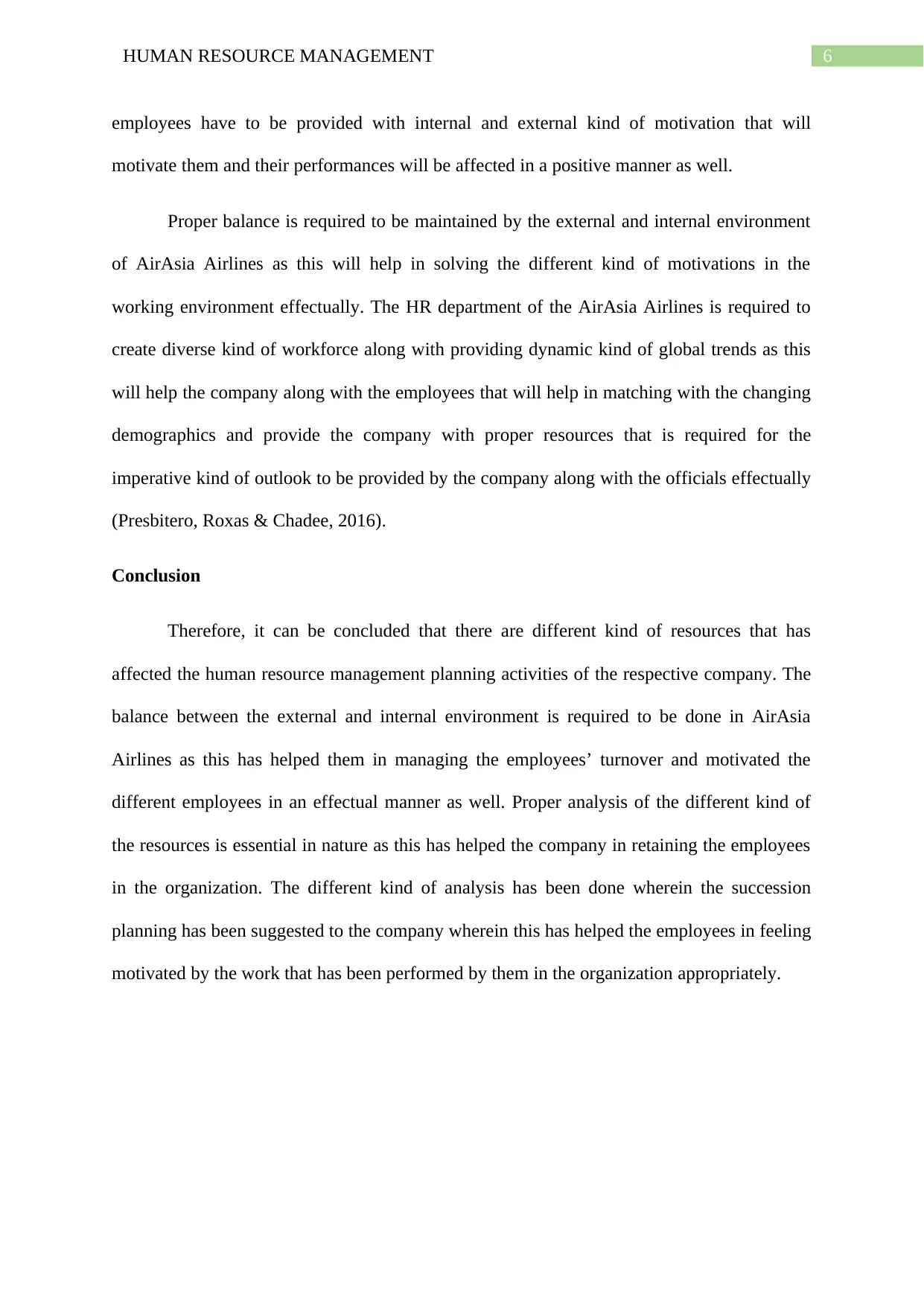
6HUMAN RESOURCE MANAGEMENT
employees have to be provided with internal and external kind of motivation that will
motivate them and their performances will be affected in a positive manner as well.
Proper balance is required to be maintained by the external and internal environment
of AirAsia Airlines as this will help in solving the different kind of motivations in the
working environment effectually. The HR department of the AirAsia Airlines is required to
create diverse kind of workforce along with providing dynamic kind of global trends as this
will help the company along with the employees that will help in matching with the changing
demographics and provide the company with proper resources that is required for the
imperative kind of outlook to be provided by the company along with the officials effectually
(Presbitero, Roxas & Chadee, 2016).
Conclusion
Therefore, it can be concluded that there are different kind of resources that has
affected the human resource management planning activities of the respective company. The
balance between the external and internal environment is required to be done in AirAsia
Airlines as this has helped them in managing the employees’ turnover and motivated the
different employees in an effectual manner as well. Proper analysis of the different kind of
the resources is essential in nature as this has helped the company in retaining the employees
in the organization. The different kind of analysis has been done wherein the succession
planning has been suggested to the company wherein this has helped the employees in feeling
motivated by the work that has been performed by them in the organization appropriately.
employees have to be provided with internal and external kind of motivation that will
motivate them and their performances will be affected in a positive manner as well.
Proper balance is required to be maintained by the external and internal environment
of AirAsia Airlines as this will help in solving the different kind of motivations in the
working environment effectually. The HR department of the AirAsia Airlines is required to
create diverse kind of workforce along with providing dynamic kind of global trends as this
will help the company along with the employees that will help in matching with the changing
demographics and provide the company with proper resources that is required for the
imperative kind of outlook to be provided by the company along with the officials effectually
(Presbitero, Roxas & Chadee, 2016).
Conclusion
Therefore, it can be concluded that there are different kind of resources that has
affected the human resource management planning activities of the respective company. The
balance between the external and internal environment is required to be done in AirAsia
Airlines as this has helped them in managing the employees’ turnover and motivated the
different employees in an effectual manner as well. Proper analysis of the different kind of
the resources is essential in nature as this has helped the company in retaining the employees
in the organization. The different kind of analysis has been done wherein the succession
planning has been suggested to the company wherein this has helped the employees in feeling
motivated by the work that has been performed by them in the organization appropriately.
Paraphrase This Document
Need a fresh take? Get an instant paraphrase of this document with our AI Paraphraser
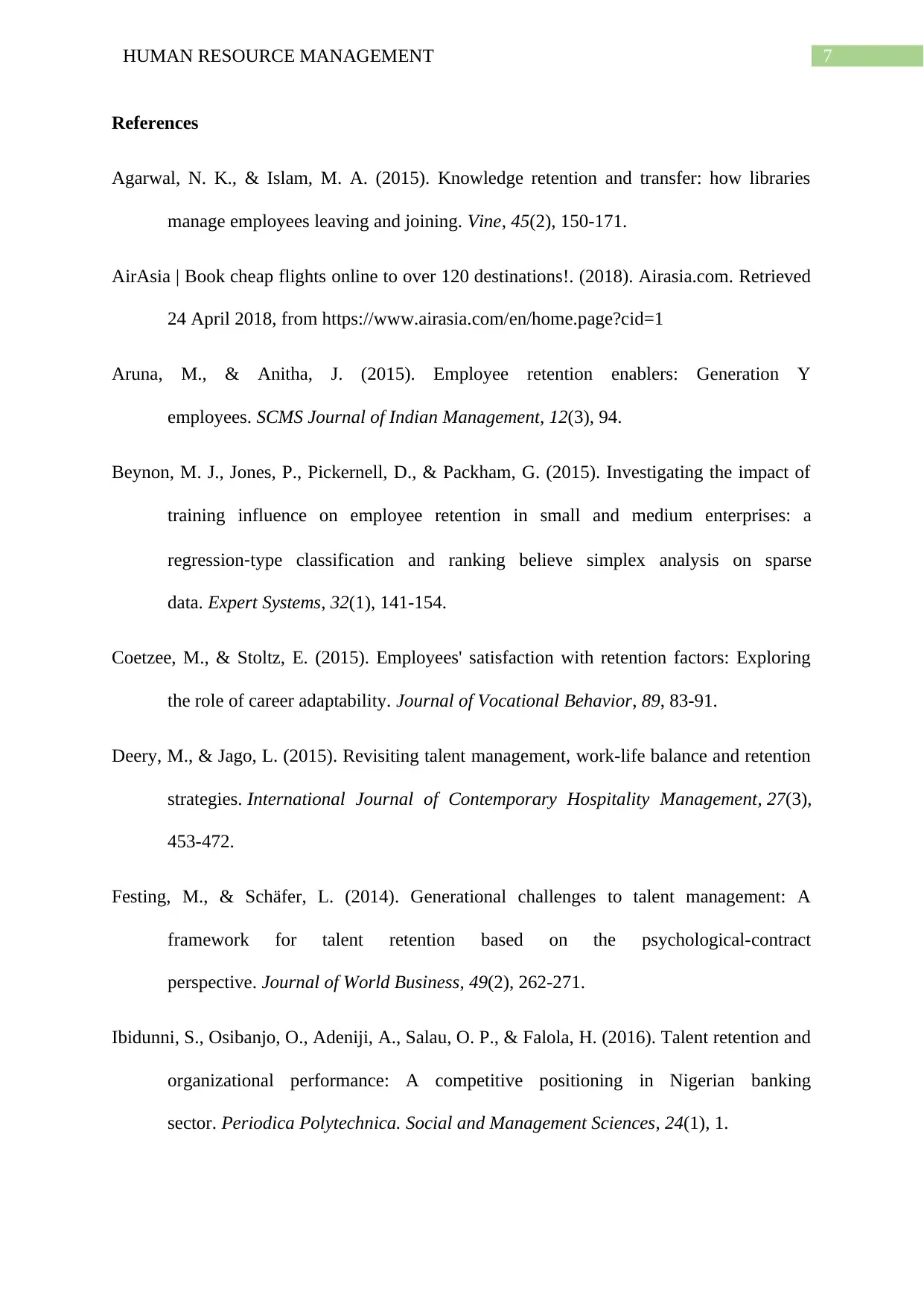
7HUMAN RESOURCE MANAGEMENT
References
Agarwal, N. K., & Islam, M. A. (2015). Knowledge retention and transfer: how libraries
manage employees leaving and joining. Vine, 45(2), 150-171.
AirAsia | Book cheap flights online to over 120 destinations!. (2018). Airasia.com. Retrieved
24 April 2018, from https://www.airasia.com/en/home.page?cid=1
Aruna, M., & Anitha, J. (2015). Employee retention enablers: Generation Y
employees. SCMS Journal of Indian Management, 12(3), 94.
Beynon, M. J., Jones, P., Pickernell, D., & Packham, G. (2015). Investigating the impact of
training influence on employee retention in small and medium enterprises: a
regression‐type classification and ranking believe simplex analysis on sparse
data. Expert Systems, 32(1), 141-154.
Coetzee, M., & Stoltz, E. (2015). Employees' satisfaction with retention factors: Exploring
the role of career adaptability. Journal of Vocational Behavior, 89, 83-91.
Deery, M., & Jago, L. (2015). Revisiting talent management, work-life balance and retention
strategies. International Journal of Contemporary Hospitality Management, 27(3),
453-472.
Festing, M., & Schäfer, L. (2014). Generational challenges to talent management: A
framework for talent retention based on the psychological-contract
perspective. Journal of World Business, 49(2), 262-271.
Ibidunni, S., Osibanjo, O., Adeniji, A., Salau, O. P., & Falola, H. (2016). Talent retention and
organizational performance: A competitive positioning in Nigerian banking
sector. Periodica Polytechnica. Social and Management Sciences, 24(1), 1.
References
Agarwal, N. K., & Islam, M. A. (2015). Knowledge retention and transfer: how libraries
manage employees leaving and joining. Vine, 45(2), 150-171.
AirAsia | Book cheap flights online to over 120 destinations!. (2018). Airasia.com. Retrieved
24 April 2018, from https://www.airasia.com/en/home.page?cid=1
Aruna, M., & Anitha, J. (2015). Employee retention enablers: Generation Y
employees. SCMS Journal of Indian Management, 12(3), 94.
Beynon, M. J., Jones, P., Pickernell, D., & Packham, G. (2015). Investigating the impact of
training influence on employee retention in small and medium enterprises: a
regression‐type classification and ranking believe simplex analysis on sparse
data. Expert Systems, 32(1), 141-154.
Coetzee, M., & Stoltz, E. (2015). Employees' satisfaction with retention factors: Exploring
the role of career adaptability. Journal of Vocational Behavior, 89, 83-91.
Deery, M., & Jago, L. (2015). Revisiting talent management, work-life balance and retention
strategies. International Journal of Contemporary Hospitality Management, 27(3),
453-472.
Festing, M., & Schäfer, L. (2014). Generational challenges to talent management: A
framework for talent retention based on the psychological-contract
perspective. Journal of World Business, 49(2), 262-271.
Ibidunni, S., Osibanjo, O., Adeniji, A., Salau, O. P., & Falola, H. (2016). Talent retention and
organizational performance: A competitive positioning in Nigerian banking
sector. Periodica Polytechnica. Social and Management Sciences, 24(1), 1.
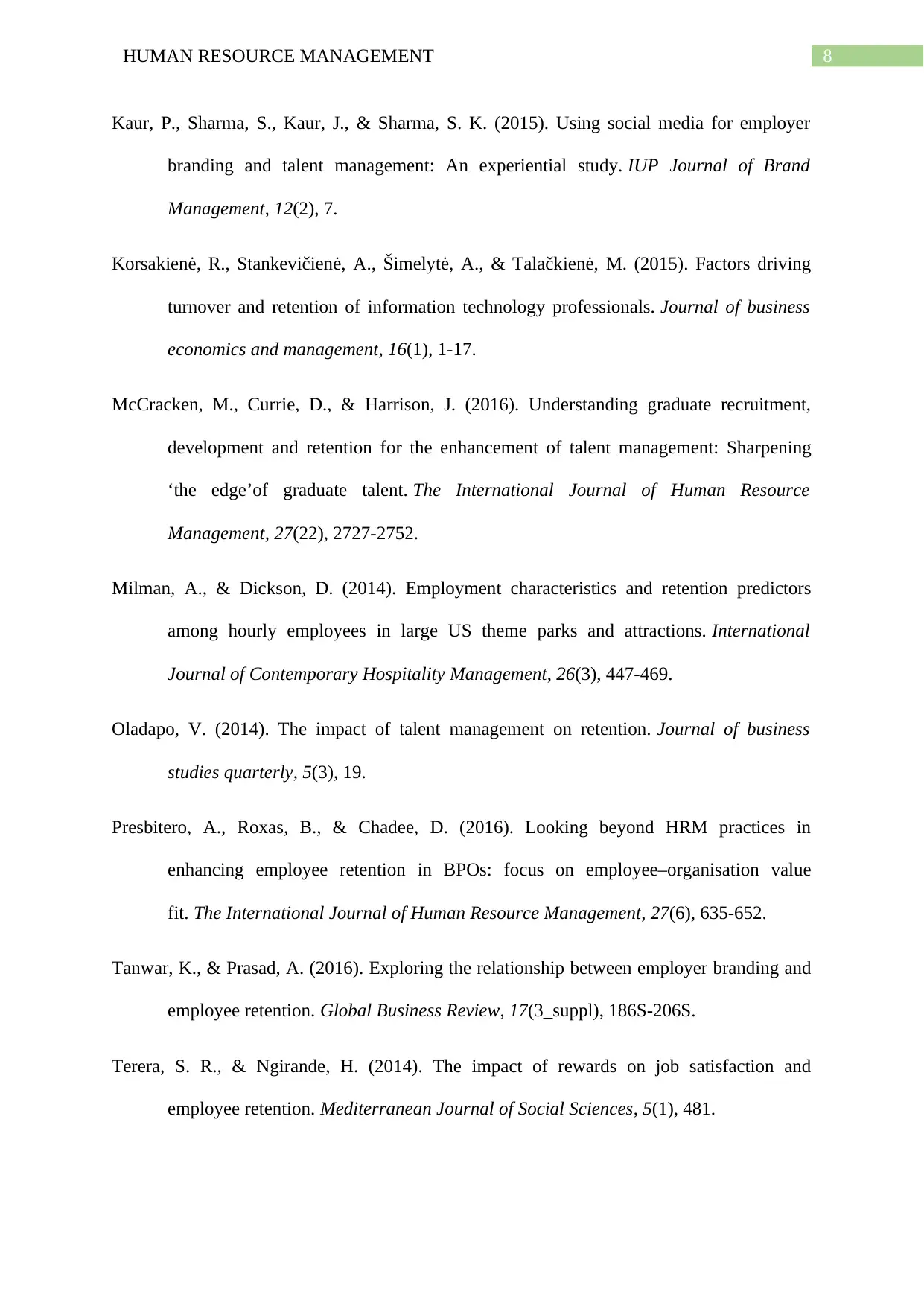
8HUMAN RESOURCE MANAGEMENT
Kaur, P., Sharma, S., Kaur, J., & Sharma, S. K. (2015). Using social media for employer
branding and talent management: An experiential study. IUP Journal of Brand
Management, 12(2), 7.
Korsakienė, R., Stankevičienė, A., Šimelytė, A., & Talačkienė, M. (2015). Factors driving
turnover and retention of information technology professionals. Journal of business
economics and management, 16(1), 1-17.
McCracken, M., Currie, D., & Harrison, J. (2016). Understanding graduate recruitment,
development and retention for the enhancement of talent management: Sharpening
‘the edge’of graduate talent. The International Journal of Human Resource
Management, 27(22), 2727-2752.
Milman, A., & Dickson, D. (2014). Employment characteristics and retention predictors
among hourly employees in large US theme parks and attractions. International
Journal of Contemporary Hospitality Management, 26(3), 447-469.
Oladapo, V. (2014). The impact of talent management on retention. Journal of business
studies quarterly, 5(3), 19.
Presbitero, A., Roxas, B., & Chadee, D. (2016). Looking beyond HRM practices in
enhancing employee retention in BPOs: focus on employee–organisation value
fit. The International Journal of Human Resource Management, 27(6), 635-652.
Tanwar, K., & Prasad, A. (2016). Exploring the relationship between employer branding and
employee retention. Global Business Review, 17(3_suppl), 186S-206S.
Terera, S. R., & Ngirande, H. (2014). The impact of rewards on job satisfaction and
employee retention. Mediterranean Journal of Social Sciences, 5(1), 481.
Kaur, P., Sharma, S., Kaur, J., & Sharma, S. K. (2015). Using social media for employer
branding and talent management: An experiential study. IUP Journal of Brand
Management, 12(2), 7.
Korsakienė, R., Stankevičienė, A., Šimelytė, A., & Talačkienė, M. (2015). Factors driving
turnover and retention of information technology professionals. Journal of business
economics and management, 16(1), 1-17.
McCracken, M., Currie, D., & Harrison, J. (2016). Understanding graduate recruitment,
development and retention for the enhancement of talent management: Sharpening
‘the edge’of graduate talent. The International Journal of Human Resource
Management, 27(22), 2727-2752.
Milman, A., & Dickson, D. (2014). Employment characteristics and retention predictors
among hourly employees in large US theme parks and attractions. International
Journal of Contemporary Hospitality Management, 26(3), 447-469.
Oladapo, V. (2014). The impact of talent management on retention. Journal of business
studies quarterly, 5(3), 19.
Presbitero, A., Roxas, B., & Chadee, D. (2016). Looking beyond HRM practices in
enhancing employee retention in BPOs: focus on employee–organisation value
fit. The International Journal of Human Resource Management, 27(6), 635-652.
Tanwar, K., & Prasad, A. (2016). Exploring the relationship between employer branding and
employee retention. Global Business Review, 17(3_suppl), 186S-206S.
Terera, S. R., & Ngirande, H. (2014). The impact of rewards on job satisfaction and
employee retention. Mediterranean Journal of Social Sciences, 5(1), 481.
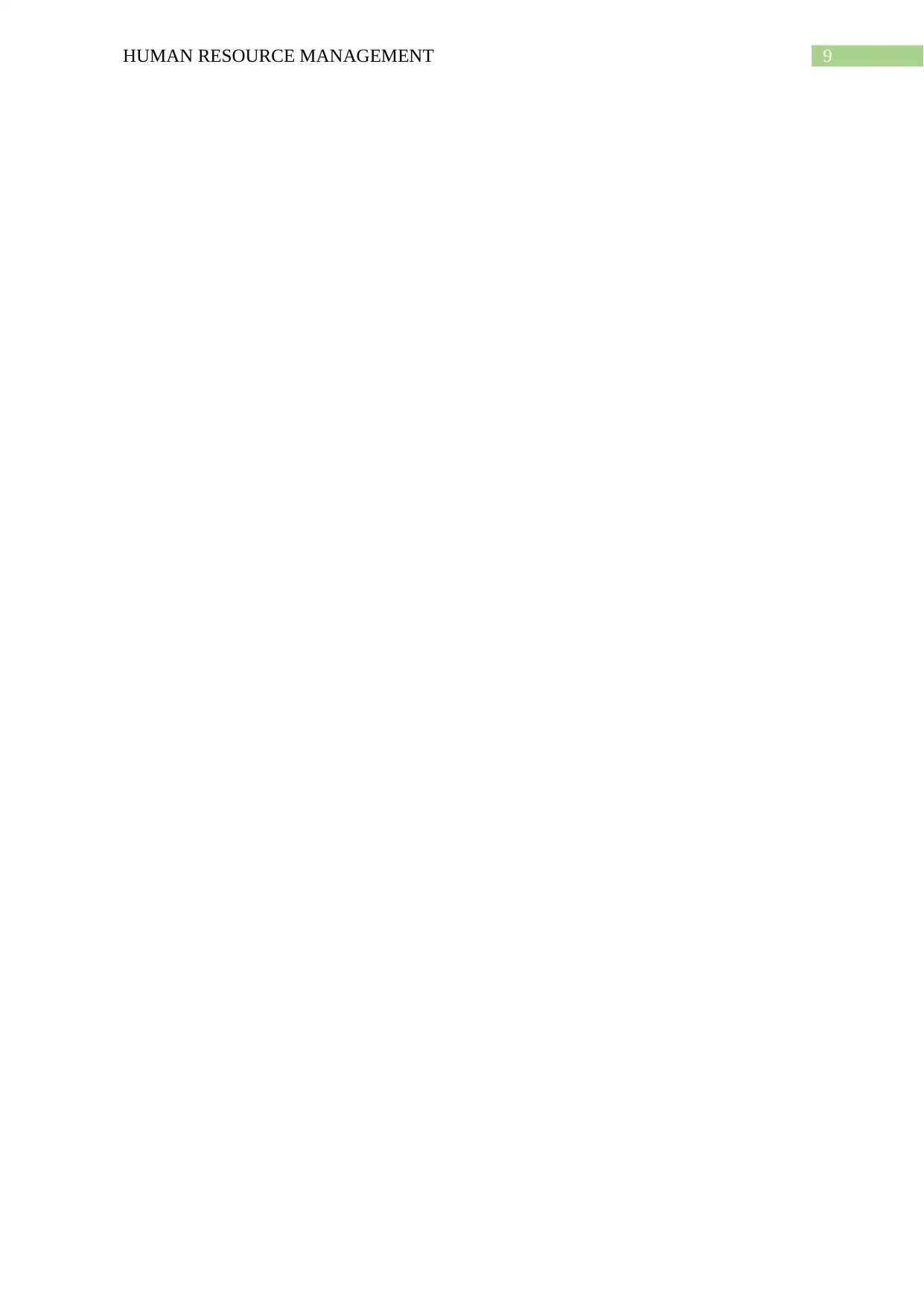
9HUMAN RESOURCE MANAGEMENT
1 out of 10
Related Documents
Your All-in-One AI-Powered Toolkit for Academic Success.
+13062052269
info@desklib.com
Available 24*7 on WhatsApp / Email
![[object Object]](/_next/static/media/star-bottom.7253800d.svg)
Unlock your academic potential
© 2024 | Zucol Services PVT LTD | All rights reserved.





